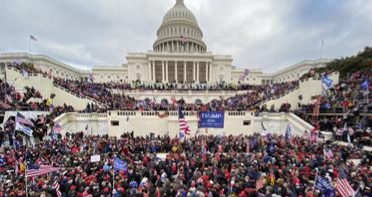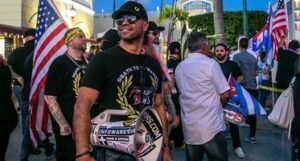
The rioters at the Capitol in America
Trump’s Jan. 6 pardons ‘undermined rule of law’

Donald Trump has pardoned hundreds of people who stormed the US Capitol in 2021 in a bid to prevent a peaceful transition of power in Washington. His actions will have grave consequences, experts warned.
As one of his first official acts following his inauguration on January 20, US President Donald Trump issued pardons to almost all the 1,600 criminal defendants charged over their involvement in the storming of the US Capitol in Washington, DC, on January 6, 2021.
Trump had previously taken to calling them the “J6 hostages.”
Among the individuals pardoned are hundreds who admitted to crimes they committed on January 6. Many others have been convicted because they acted violently toward police and other security personnel.
The sweeping pardons at the very start of Trump’s second term in office were an extraordinary move on his part, according to legal experts.
“Pardons are typically thought of as something that happens towards the end of an administration,” said Aimee Ghosh, partner at the public policy practice of international law firm Pillsbury and a government law expert.
“Historically, you don’t see pardons being a huge focus of day one actions, although sometimes presidents sign pardons throughout their term, especially in connection with legislation that decriminalizes a certain action,” she told DW.
This was not the case with those convicted in connection with the January 6 riot. Attacking police officers remains a grave offense under US law.
So why did Trump sign a “full, complete and unconditional pardon,” as it is worded in his decree, for almost all participants in the attack on the Capitol?
Typical Trump style
Trump has always maintained that the criminal defendants were simply victims of a campaign by his opponents.
In the first TV interview in his second term — with the Trump-friendly broadcaster Fox News — the president spoke of unnecessarily harsh prison conditions suffered by those convicted. He also asserted that they had just been “protesting the vote, and you should be allowed to protest the vote.”
When the host suggested that demonstrators should not be allowed to enter the Capitol, Trump said most of the people “were absolutely innocent.”
Joseph Margulies, a politics professor at Cornell University in Ithaca, New York, said it’s impossible to work out whether Trump really believes that, whether the pardons are an act of political calculation or whether they are a mixture of both.
But, Margulies said, the pardons fit in well with Trump’s overall style. “Trump’s particular brand of muscular populism and in-your-face nationalism thrives on taking positions that thumb their nose at certain conventions,” he said.
“That narrative of not just ignoring conventions but smashing them is his brand. And doing it in a way that attempts to rewrite history in a manner that’s congenial to his base. And this [the pardons] is of a piece with that,” he added.
Partisan amnesty?
Bernadette Meyler, law professor at Stanford University and a scholar of British and American constitutional law, argues the pardons granted by Trump to the convicts “was more like an amnesty than an individual pardon.”
“This is because it was collective in nature and did not specify particular crimes for which the individuals were pardoned,” she wrote in an email to DW.
“The exceptional nature of this amnesty consists in how it furnished support for those on Trump’s own side politically,” Meyler wrote.
Who was pardoned?
The convicts were mostly Trump supporters who believed his lie — which has been confirmed as such by several courts — that the Democrats had “stolen” the 2020 election and that he, Trump, had been the true winner.
On January 6, 2021, Congress lawmakers were involved in certifying the election victory of Joe Biden when a furious mob fought its way into the Capitol building. Shortly before, Trump had given a speech nearby in which he reiterated that he was the winner and called on his supporters to march on the Capitol.
Four Trump supporters died during or ahead of the attack. One police officer suffered two strokes in the wake of the events and died a short time afterward. Four other police officers who had been on the scene committed suicide in the weeks and months following the Capital riot.
Trump was officially accused by the lower house of Congress, the House of Representatives, of inciting the insurrection, but the Republican-majority Senate ended up acquitting him.
‘Pardons have substantially undermined the rule of law’
A US president’s right to issue pardons is based on the realization that “the law can be cruel,” said Margulies. The president has the power to show mercy.
Looking back at the US Capitol riot
On January 6, 2021, supporters of Donald Trump stormed the US Capitol, refusing to accept the confirmation of Joe Biden’s election as president.
Pro-Trump crowd gathers outside US Capitol
On January 6, thousands of supporters of former President Donald Trump flocked to the US Capitol, waving flags and claiming the election had been stolen from their political idol. Later, some 800 protesters stormed the iconic building, hunting down lawmakers, beating up police officers and leaving a trail of destruction. Five people died in connection with the riot and dozens were injured.
Trump remains defiant
Many observers later said the riot marked an attempt to overthrow the government, instigated or orchestrated by the former president. A select committee of the US House of Representatives has begun investigating the events, and Trump’s possible role in them. For his part, Trump has claimed there was “love in the air” on January 6.
Legitimate protests?
The Capitol riot sparked global outrage. Many Republicans still, however, say the incident was a legitimate means of protest against what they claim was a rigged election. Some Republicans have even staged rallies outside US prisons in support of jailed rioters. The exact interpretation of the January 6 events will certainly have a big impact on the US midterm elections in November 2022.
More than 700 charged
Hundreds of individuals are facing prosecution over their role in the January 6 attack. So far, over 50 people have been sentenced for their actions on that day. Many left a slew of evidence on social media, boasting of their crimes, which has helped in handing down convictions. Defendants willing to plead guilty can hope to receive a reduced sentence.
Proud Boys under growing scrutiny
The city of Washington, D.C, is suing members of the right-wing extremist group Proud Boys, loyal Trump supporters, to recoup damages for the Capitol attack. Authorities have accused the group’s leaders of having conspired “to terrorize the District of Columbia” in “a coordinated act of domestic terrorism.” Criminal charges have already been brought against several Proud Boys members.
Panel probes role of firebrand radio host
Radio host and conspiracy theorist Alex Jones is considered a key instigator of the Capitol riot. He drummed up support for the pro-Trump march in Washington, calling for a million people to turn up and protest against allegedly corrupt Democratic Party. The congressional panel investigating the events of January 6 has found Jones helped finance the rally.
Jacob Chansley, ‘QAnon Shaman,’ jailed
Images of Jacob Chansley, a topless, tattooed rioter wearing a striking, horned headdress, went around the globe. He soon became a symbol of the January 6 attack. Now, the self-proclaimed “QAnon Shaman” and conspiracy theorist from Phoenix, Arizona, has pleaded guilty and been sentenced to 3 1/2 years in jail.
Police officers traumatized
Capitol Police officer Aquilino Gonell broke down as he rewatched footage of the deadly riot during a hearing of the congressional panel investigating the attack in July. That day, Gonell recalls, he thought “this is how I’m going to die, defending this entrance.” One of Gonell’s fellow police officers was killed in the Capitol riot, and four others committed suicide in the months that followed.
Security failures led to Capitol storming
The reason die-hard Trump supporters managed to force their way into the Capitol is that US security agencies were unprepared. The US Senate found that despite warning signs of a potential attack, the police leadership failed to act: National Guard reinforcements were called in too late, and the FBI and the Department of Homeland Security downplayed the threat of violence.
Is a Trump comeback possible?
Many political analysts predict Donald Trump will run again in the 2024 presidential election. While his supporters would be elated, critics would surely regard this as a nightmare come true. Until now, Trump has weathered practically all political scandals — not even his role in the January 6 Capitol attack seems to have undermined a potential comeback.
